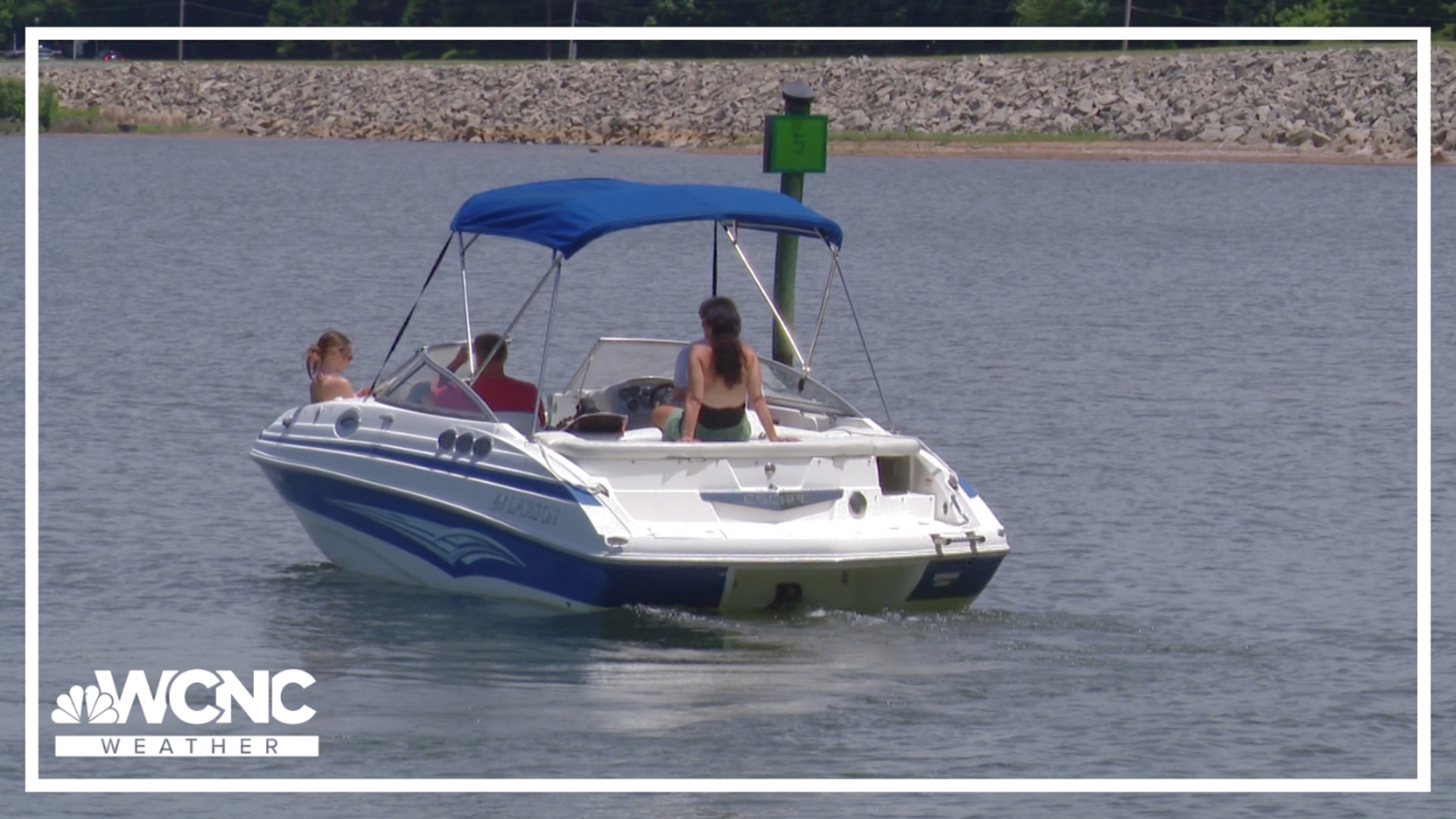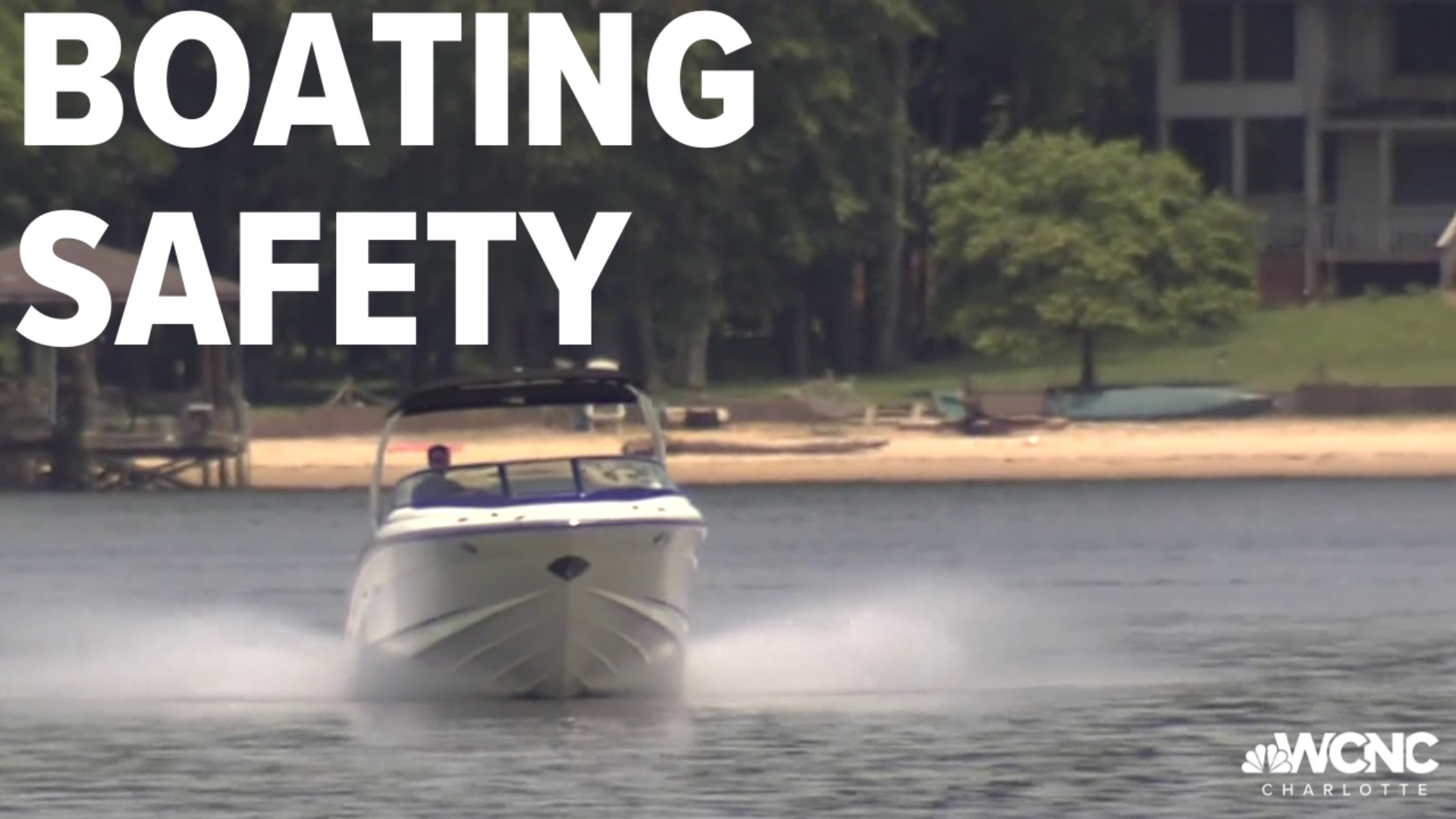CHARLOTTE, N.C. — Memorial Day weekend means the unofficial start to summer and it's also Water Safety Month, with officials across the Charlotte area promoting ways to have fun on the lake or at the pool while staying safe.
Whether you are cruising in a boat on the water or swimming in it, there are plenty of resources out there to ensure safe swimming and boating practices for you and your loved ones.
And while you may think you're taking enough precautions, there's a possibility you're missing something that makes the water even safer. Over half of drowning victims are found within 10 feet of safety, according to the YMCA of Greater Charlotte and they say many child drownings occur under adult supervision.
According to the CDC's guidelines for Health and Safe Swimming Week, most drownings happen quickly and quietly.
The CDC also provides information about pools, hot tubs splash pads and water quality information for oceans, lakes and rivers by state.
The North Carolina Department of Health and Human Services is encouraging people to follow these safety tips:
- Put down your phones: Monitor children at all times around pools and any body of water. Unlike the flailing depicted on television, a drowning child is more likely to slip silently underwater, which can be barely noticeable until it is too late.
- Keep pools secure: Close and lock or latch gates or doors every time they are not being used. Never prop a gate or door open and do not remove or lock ladders when aboveground pools are not in use.
- Know the water conditions: Be aware of potential hazards such as strong currents, undertows or sudden changes in water depth.
- Stay out of the water if you are sick with diarrhea.
READ MORE: 'Worst possible setup': Weekend storm system will bring heavy rain, cool temps to Carolinas
YMCA of Greater Charlotte Emphasizes Water Safety During Summer Months
The YMCA of Greater Charlotte is emphasizing the importance of water safety during the summer months.
Ame Guy, the Association Director of Aquatics for the YMCA of Greater Charlotte, said drowning is the leading cause of death for children ages 1 to 4.
“Everyone thinks of drowning as a red flag or a wave or call for help,” Guy said. “It is silent. It goes undetected, and it is quick.”
Guy said the pandemic set children back years when it comes to swimming lessons.
“Normally, we would be very cautious of your 3-to-5-year-olds because that is the highest risk,” Guy said.
Guy said that’s due to children in this age group having the competence to swim, but not the skills.
“Now we're seeing it in our 5-to-eight-year-olds because they weren't able to get their swim lessons in,” Guy said.
The YMCA offers swim lessons for all ages, from toddlers to adults.
“Children love water, they will find it right,” Guy said. “So, we just need to make sure as parents we’re super vigilant of their whereabouts and where they are constantly.”
WCNC Charlotte spoke with two beginners, Ella and Finley, about their swimming lessons at the Harris YMCA.
“Just listen to your swim instructor,” Ella answered when asked what to do if someone panics in the water.


The YMCA of Greater Charlotte has 34 pools across five different counties and three waterfronts.
Guy said the YMCA is committed to providing safe and fun experiences for all members of the community.
“We have seen our adult swim lesson participation skyrocket,” Guy said. “So that brings me so much joy because that means our adults are brave.”
If you are interested in learning more about the YMCA's water safety programs, you can visit their website here.
Water safety tips from the YMCA
- Learn to swim
- Never leave children unattended in or around water
- Wear a life jacket
- Never swim alone or in unsupervised places
- Look for lifeguards
- Check the water depth
- Understand dry drowning
Shamarria Morrison: Contact Shamarria Morrison at smorrison@wcnc.com and follow her on Facebook, Twitter and Instagram.
Boating safety
Law enforcement wants you to have a good time on the water, but to do it safely.
Officials warn, that if you're caught exceeding the legal limit, your day on the lake could be over sooner than you'd like.
There was a show of force Friday with law enforcement agencies from both sides of the state line kicking off their campaign "On the road, on the water, don't drink and drive."
The North Carolina Wildlife Resources Commission said more people hit the lake in the months of May, June and July. That's when they see the most boating incidents, many of which could have been prevented.
"Be sure to designate an observer, wear an appropriate life jacket, and refrain from mixing alcohol and other impairing substances," said Officer Sampson Parker of North Carolina Wildlife Resources.
"We want everybody to have a good time and great weekend and take their families out. But remember, you have some of our most precious cargo in vehicles and vessels and you need to be paying attention," added Ellen Pitt with Mothers Against Drunk Driving.
Another tool officers discussed is the Alcohol BAT mobile unit, serving as a one-stop shop.


"The officer would do sobriety outside, bring them in. they'd test their breath," said Nathan Greene, with the Alcohol BAT mobile unit. "If they're unable or if the person refuses, they'd get a search warrant for their blood. If the magistrate is here, they can issue a search warrant."
Officials reminded that all passengers 12 and under are required to wear a U.S. Coast Guard-approved life jacket on a moving vessel.


Three lakes are within 30 minutes of Charlotte: Lake Norman, Lake Wylie and Mountain Island Lake. The Charlotte Fire Department is one of many local public safety organizations that has come together to promote safe practices on area lakes.
Boater Safety Awareness Tips
- Wear a life jacket - No matter what activity you have planned on the water, always remember to wear a life jacket every time you are on the water. Accidents on the water can happen much too fast to reach and put on a stowed life jacket.
- Make sure your life jacket is U.S. Coast Guard approved, appropriate for your water activity and fits properly - A life jacket that is too large or too small can cause different situational problems.
- Take a boating safety course - Learn valuable tips that can help save your life in unexpected situations by taking a NASBLA (National Association of Boating Law Administrators) approved boating safety course. Many courses are online and will save you money on your boat insurance.
- Make sure your boat is prepared - There are many items that need to be checked and rechecked on any boat. Schedule a Vessel Safety Check with your local U.S. Coast Guard Auxiliary or U.S. Power Squadrons before you hit the water. Every Vessel Safety Check is conducted 100 percent free of charge.
- Be sure to know your boat’s capacity - If you have too much on your boat, the boat may become unstable and capsize.
- Check the weather, including the water temperature - Know the latest marine weather forecast prior to going out and keep a regular check for changing conditions.
- Dress properly - Always dress for the weather, wearing layers if cooler weather, and bring an extra set of clothes in case you get wet.
- Always file a float plan - File a float plan with someone you trust that includes details about the trip, people onboard, where you are going, when you will return, and emergency contacts.
- Always follow navigation rules - Know the “Rules of the Road” such as operator’s responsibility, maintaining a proper lookout, safe speed, crossing, meeting head-on and overtaking situations. always know what’s going on around you, and always travel at safe speeds for the environment.
- Don’t drink while you boat - Where the primary cause was known, alcohol was listed as the leading factor in 15 percent of deaths in 2016.
- Beware of carbon monoxide poisoning - Gasoline-powered engines on boats, including onboard generators, produce carbon monoxide (CO), a colorless and odorless gas that can poison or kill someone who breathes too much of it. Be sure to install and maintain a working CO detector, never block exhaust outlets, and always dock, beach or anchor at least 20 feet away from the nearest boat that is running a generator or engine.
- Keep in touch - Communication devices can be the most important piece of emergency equipment on board a vessel, especially in case of emergency. Be sure to have at least two communication devices that work when wet, such as satellite phones, emergency position indicating radio beacons (EPIRB), VHF radios and personal locator beacons (PLB). Cell phones are not reliable in emergency.
- Leash - If a standup paddleboard activity is featured, the participant should wear an appropriate leash for the venue. This is attached to the paddleboard and to the participant’s ankle or calf.
- Engine Cut-Off Device - An engine cut-off device should always be used on a watercraft with a motor (i.e. powerboat, personal watercraft). This may be a cord lanyard that is attached to the operator’s wrist or life jacket, and then properly attached, or a wireless device that includes a wristband or visible fob for the boat operator and/or passengers. An engine cut-off device will immediately stop the boat’s engine should the operator, or for some brands - even passenger, fall overboard.
- Stay Weather Aware: Keep your eyes on the sky due to sudden changes in the weather. Have a way of getting weather notifications while on the water. Start making your way back to shore if a storm develops instead waiting to the last minute to help avoid congestion at the boat ramp. And don't be overconfident in your ability to operate a boat at night or low visibility caused by fog, heavy rain, or windy conditions.
Jane Monreal: Contact Jane Monreal at jmonreal@wcnc.com and follow her on Facebook, Twitter and Instagram.
Wake Up Charlotte To Go is a daily news and weather podcast you can listen to so you can start your day with the team at Wake Up Charlotte.
SUBSCRIBE: Apple Podcasts || Spotify || Stitcher || TuneIn || Google Podcasts
All of WCNC Charlotte's podcasts are free and available for both streaming and download. You can listen now on Android, iPhone, Amazon, and other internet-connected devices. Join us from North Carolina, South Carolina, or on the go anywhere.


